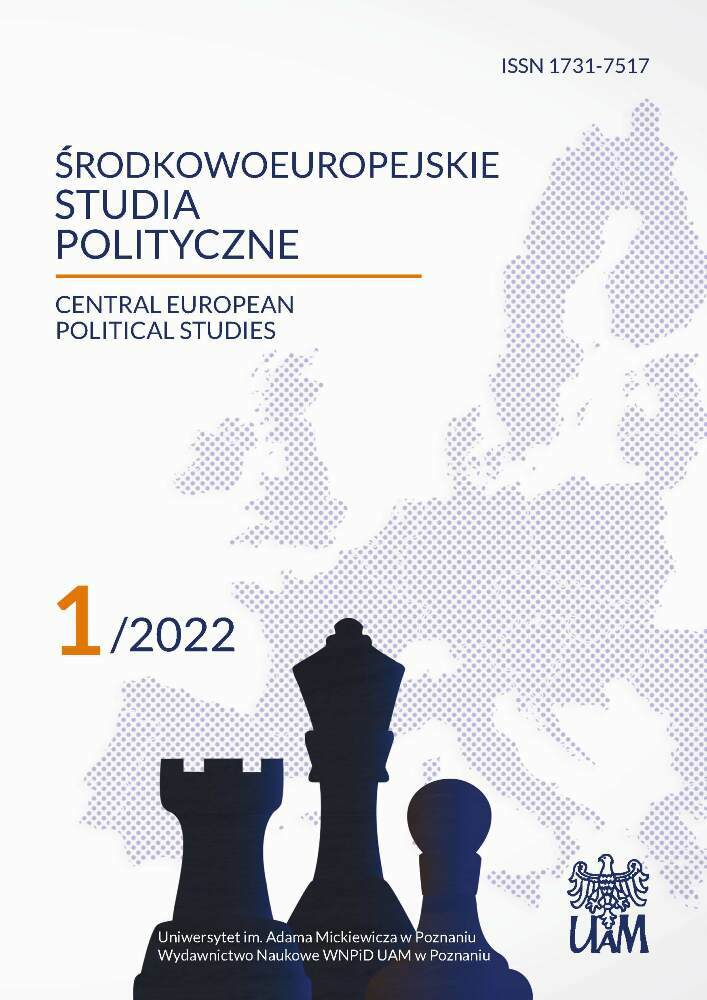Abstract
Poland’s power plays an important role in building the image and international position of the country in the region. It is a good starting point to conduct a proactive policy, which gives Poland the opportunity to act on behalf or in defence of smaller regional neighbours. This, of course, can increase Poland’s own significance and potentially opens new political opportunities to contribute to the realization of its own geostrategic interests and goals; in this sense, broadening its influence. It is therefore worth analysing the roles that Poland plays within its region and find the answer to the question of how its position evolves, and to what extent regional roles have an impact on the international position and strength of the state in the European Union. The paper argues that Poland does not effectively exploit cooperation in regional organizations. Thus, its role remains below its own capabilities and it is inferior to the nation’s ambitions. Nevertheless, there is still potential to strengthen the state’s position and its international role in the European Union and beyond.
References
Brudzińska K. (2013), Polityka wspierania demokracji przez kraje Grupy Wyszehradzkiej – czy możliwa jest lepsza współpraca?, “Bulletin” no. 9 (985), The Polish Institute of International Affairs, Warsaw.
Brzeziński Z. (2009), An Agenda for NATO: Toward a Global Security Web, “Foreign Affairs” vol. 88, no. 5 September/October.
Buras P. (2014), Has Germany sidelined Poland in Ukraine crisis negotiations?, “The European Council on Foreign Relations (ECFR)” August 27, https://www.ecfr.eu/article/commentary_has_germany_sidelined_poland_in_ukraine_crisis_negotiations301.
Collins Dictionary (2020), Central Europe, HarperCollins Publishers, Accessed 05 August 2019, https://www.collinsdictionary.com/dictionary/english/central-europe.
Dangerfield M. (2011), Visegrad Group Cooperation and ‘Europeanisation’ of New EU Member States, in: Democracy, State and Society: European Integration in Central and Eastern Europe, eds. M. Góra, K. Zielińska, Jagiellonian University Press, Krakow, P. 293–310.
Division for Sustainable Development Goals (UN-DESA), “Introduction”. n. d. Central European Initiative (CEI), https://sustainabledevelopment.un.org/index.php?page=view&type=30022&nr=1857&menu=3170.
European Commission (2010), The European Transition Compendium Report – ETCI, 25 November, https://ec.europa.eu/europeaid/european-transition-compendium-report-etc_en, 04 August 2019.
European Defence Agency (2013), EDA’s Pooling & Sharing, last update 30 January 2013, https://www.eda.europa.eu/docs/default-source/eda-factsheets/final-p-s_30012013_factsheet_cs5_gris.
Gajewski J. (2002), Europa Środkowa w polskiej polityce zagranicznej, in: Polityka zagraniczna RP 1989–2002, eds. R. Kuźniar, K. Szczepanik, ASKON Publishing House, Warsaw.
Gizicki W. (2010), Grupa Wyszehradzka wobec wybranych problemów bezpieczeństwa w Europie Wschodniej, in: Bezpieczna Europa z perspektywy Wschodu, ed. W. Walkiewicz, SGGW Publishing House, Warsaw.
Gostyńska A., Parkes R. (2012), Towards a V4 Position on the Future of Europe, Polish Institute of International Affairs, Warsaw.
Jordan P. (2005), Großgliederung Europas nach kulturräumlichen Kriterien, “Europa Regional”, vol. 13 (4), p. 162–173.
Kałan D. (2013), East of Centre: Can the Visegrad Group Speak with One Voice on Eastern Policy?, “Policy Paper”, no. 5 (53), The Polish Institute of International Affairs, Warsaw.
Kugiel P. (2011), Współpraca rozwojowa krajów wyszehradzkich: wyzwania i szanse na wspólne działania, “Bulletin”, no. 103 (852), The Polish Institute of International Affairs, Warsaw.
Kuźniar R. (2002), Ewolucja międzynarodowych uwarunkowań polskiej polityki zagranicznej po 1989 roku, in: Polityka zagraniczna RP 1989–2002, eds. R. Kuźniar, K. Szczepanik, ASKON Publishing House, Warsaw.
Lorenz W. (2013), Grupa bojowa UE – szansa na przełom we współpracy Grupy Wyszehradzkiej?, “Bulletin”, no. 38 (1014), The Polish Institute of International Affairs, Warsaw.
López-Dóriga E. (2018), Refugee crisis: The divergence between the European Union and the Visegrad Group, University of Navarra: Global Affairs Strategic Studies, June 16, https://www.unav.edu/web/global-affairs/detalle/-/blogs/refugee-crisis-the-divergence-between-the-european-union-and-the-visegrad-group, 06 September 2019.
Madej M. (2010), Cooperation on security in Central Europe: sharing V4 experience with the neighboring regions, The Polish Institute of International Affairs, Warsaw.
Michelot M. (2018), The V4 on Defence: The Art of Disagreement, European Leadership Network 26 June, https://www.europeanleadershipnetwork.org/commentary/the-v4-on-defence-the-art-of-disagreement/.
Milan N., Gyarmati I., Vlkovsky J., Zornaczuk T. (2012), The Visegrad Group: Exploring New Agenda for the Western Balkans, “Policy Brief”, The Polish Institute of International Affairs, Warsaw.
Nałęcz D. (2017), Intermarium vs the Three Seas Initiative, The New Eastern Europe July 6, Lazarski University in Warsaw, http://neweasterneurope.eu/2017/07/06/intermarium-vs-the-three-seas-initiative/.
NATO (2017), Smart Defence, last updated 20 February 2017, https://www.nato.int/cps/en/natohq/topics_84268.htm.
Nemeth B. (2018), Militarisation of cooperation against mass migration – the Central European Defence Cooperation (CEDC), “Defense & Security Analysis”, vol. 34, no. 1, February 15.
Onultalia, CEI (Central European Initiative) is becoming a natural partner of the UN, says Zappia at HLPF, OnuItalia July 18, https://www.onuitalia.com/2019/07/18/cei-central-european-initiative-is-becoming-a-natural-partner-of-the-un-says-zappia-at-hlpf/, 08 Aug 2019.
Paulech M., Urbanovská J. (2014), Visegrad Four EU Battlegroup: Meaning and Progress, “Obrana A Strategie”, no. 2, https://www.obranaastrategie.cz/cs/archiv/rocnik-2014/2-2014/clanky/visegrad-four-eu-battlegroup-meaning-and-progress.html.
Pawlak A. (2011), Kształtowanie się tożsamości Europy Środkowej a proces integracji europejskiej, Wydawnictwo Naukowe Grado, Toruń.
Poland’s Ministry of Foreign Affairs, Internet Portal, https://www.msz.gov.pl/pl/polityka_zagraniczna/organizacje_miedzynarodowe/inne_org_miedzynarodowe/inicjatywa_srodkowoeuropejska/, 06 August 2019.
Romanowska A. (2018), V4 countries towards Russian aggression against Ukraine, “The Warsaw Institute Review”, September 24.
Sienkiewicz M. (2016), Koncepcja Trójmorza w polityce zagranicznej Polski po 2015 r., “Dyplomacja i bezpieczeństwo”, no. 1(4).
Szczerski K. (2009), Polityka wschodnia Unii Europejskiej a strategia Grupy Wyszehradzkiej, in: Partnerstwo Wschodnie w kontekście Europejskiej Polityki Sąsiedztwa i agendy Grupy Wyszehradzkiej, ed. I. Albrycht, Instytut Kościuszki – Instytut Integracji Europejskiej, Krakow.
Tiersky R. (2004), Europe today, Rowman & Littlefield, Lanham.
Visegrad Discussion Papers (2007), Migration. Are we ready for it?, March 17, http://www.visegradgroup.eu/migration/migration.
Vit D., Przybylski W., Janebová P., Strážay T., Vé gh Z. (2016), V4 – 25 Years the Continuing Story of the Visegrád Group 1991–2016, Fundacja Res Publica im. Henryka Krzeczkowskiego, Warsaw.
Wójcik A. (2019), Slovakian president appeals for observance of rule of law in Visegrad Group and queries Poland’s president on changes to justice system, “Rule of Law”, July 22, https://ruleoflaw.pl/slovakian-president-appeals-for-observance-of-rule-of-law-in-visegrad-group-and-queries-polands-president-on-changes-to-justice-system/.
License
Copyright (c) 2022 Anna LLANOS-ANTCZAK, Zdzisław ŚLIWA

This work is licensed under a Creative Commons Attribution 4.0 International License.

